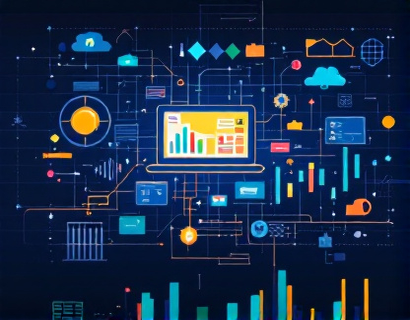Unlocking Next-Gen Productivity with AI and Crypto: A New Era of Digital Solutions
The integration of Artificial Intelligence (AI) and cryptocurrency is revolutionizing the way we approach digital productivity. This synergy is not just about combining two advanced technologies but about creating a new paradigm where efficiency, task management, and innovation converge. For tech innovators and early adopters, this intersection offers unprecedented opportunities to redefine productivity in the modern workplace. This article delves into how AI and cryptocurrency are reshaping digital solutions, providing insights and examples that highlight the potential of these technologies to transform various aspects of work and daily life.
Understanding the Synergy: AI and Cryptocurrency
AI and cryptocurrency, though distinct, share a common foundation in decentralization and data-driven decision-making. AI's ability to process vast amounts of data quickly and accurately complements cryptocurrency's decentralized and secure nature. This combination can lead to more efficient, transparent, and user-centric digital solutions. For instance, AI can enhance the security and functionality of blockchain networks, while cryptocurrency can provide a new economic model for AI-driven services.
Enhancing Task Management with AI
One of the most immediate impacts of AI in the workplace is in task management. AI-powered tools can analyze user behavior, predict workloads, and optimize task assignments. These tools use machine learning algorithms to understand patterns and preferences, ensuring that tasks are distributed efficiently and effectively. For example, AI can prioritize tasks based on urgency and importance, reducing the cognitive load on users and increasing overall productivity.
Consider a scenario where an AI system monitors a team's project management activities. It can identify bottlenecks, suggest optimal workflows, and even automate routine tasks such as data entry or report generation. This not only saves time but also reduces the risk of human error, allowing team members to focus on higher-value activities that require human creativity and critical thinking.
Cryptocurrency and Decentralized Workflows
Cryptocurrency introduces a new dimension to decentralized workflows. By leveraging blockchain technology, cryptocurrency can facilitate secure and transparent transactions without the need for intermediaries. This is particularly beneficial in collaborative environments where multiple parties need to exchange value or data. Smart contracts, self-executing contracts with the terms directly written into code, can automate and enforce agreements, reducing the need for manual oversight and increasing trust among participants.
For instance, in a global project, cryptocurrency can be used to pay contributors in real-time, ensuring that everyone is compensated fairly and promptly. This eliminates the delays and complexities associated with traditional payment methods, fostering a more agile and responsive work environment.
AI-Driven Predictive Analytics
AI's strength lies in its ability to perform predictive analytics, which can significantly enhance decision-making processes. By analyzing historical data and current trends, AI can forecast future scenarios, helping organizations make informed decisions. In the context of productivity, this means anticipating resource needs, identifying potential issues before they arise, and proactively addressing them.
For example, an AI system can analyze past project data to predict the likelihood of delays or cost overruns. It can then suggest adjustments to project plans, resource allocations, or timelines to mitigate these risks. This proactive approach not only improves project outcomes but also enhances the overall efficiency of the team.
Decentralized Identity and Access Management
Another area where AI and cryptocurrency intersect is in decentralized identity and access management. Traditional identity verification processes can be cumbersome and vulnerable to breaches. By using blockchain and AI, organizations can create secure, decentralized identity systems that empower users to control their own data while ensuring robust security measures.
AI can enhance these systems by analyzing user behavior and detecting anomalies in real-time. For instance, if an unusual login attempt is detected, the AI can trigger additional verification steps, ensuring that only authorized users access sensitive information. This not only protects data but also streamlines the access management process, reducing administrative overhead.
Tokenized Incentives and Motivation
Cryptocurrency can also be used to create tokenized incentive systems that motivate employees and contributors. By issuing tokens that represent value or rewards, organizations can align individual goals with organizational objectives. These tokens can be used within the ecosystem to purchase services, access premium features, or even traded for other cryptocurrencies or fiat currencies.
For example, a company can introduce a token-based system where employees earn tokens for completing tasks, achieving milestones, or contributing to the community. These tokens can be redeemed for various rewards, creating a gamified work environment that boosts engagement and productivity. The transparency and immutability of blockchain ensure that the system is fair and tamper-proof, fostering trust among participants.
Challenges and Considerations
While the potential benefits are significant, integrating AI and cryptocurrency into digital solutions also comes with challenges. One of the primary concerns is the regulatory landscape. Cryptocurrency is still a relatively new and evolving field, with varying regulations across different jurisdictions. Organizations must navigate these regulations carefully to ensure compliance and avoid legal issues.
Another challenge is the technical complexity involved in implementing these technologies. AI and blockchain require specialized knowledge and resources, which can be a barrier for some organizations. However, as the ecosystem matures, more user-friendly tools and platforms will emerge, making it easier for businesses of all sizes to adopt these technologies.
Future Prospects
The future of AI and cryptocurrency in digital productivity is promising. As these technologies continue to evolve, we can expect even more innovative solutions that further enhance efficiency and collaboration. The integration of AI with other emerging technologies, such as the Internet of Things (IoT) and 5G, will create a more interconnected and intelligent digital world.
In this future, AI-driven AI can optimize not just tasks but entire ecosystems, from smart cities to industrial processes. Cryptocurrency will play a crucial role in facilitating seamless transactions and value exchange within these ecosystems, creating a truly decentralized and autonomous digital economy.
For tech innovators and early adopters, embracing AI and cryptocurrency offers a competitive edge. By staying at the forefront of these trends, they can develop solutions that not only meet current needs but also anticipate future demands. The key is to remain flexible, open to experimentation, and committed to continuous learning and adaptation.
Conclusion
The convergence of AI and cryptocurrency is paving the way for a new era of digital productivity. By leveraging the strengths of both technologies, organizations can achieve unprecedented levels of efficiency, transparency, and innovation. As we move forward, it is essential to address the challenges and embrace the opportunities that this synergy presents. For those ready to explore this exciting frontier, the possibilities are endless.











































